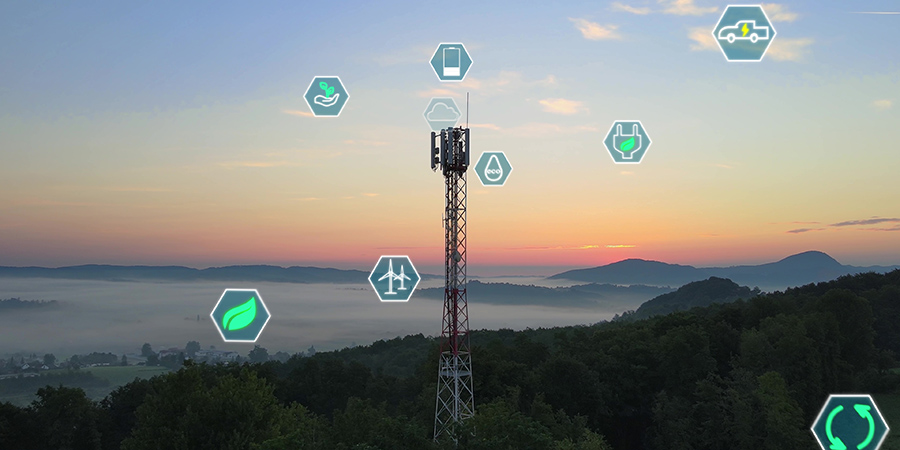A recent report by Juniper Research revealed that Japan’s KDDI is the world’s most sustainable mobile operator, underscoring the region's commitment to integrating environmental responsibility with cutting-edge technology.
With the rise of cloud computing, circular economy initiatives, and renewable energy adoption, Asia-Pacific operators are setting new benchmarks for sustainable practices, shaping a green future across the global telecom industry.
Exclusive: KDDI Digital Life on Transforming Connectivity through Data, Apps, and Emerging Tech
KDDI: A Sustainability Champion in Asia
Japan's KDDI stands at the forefront of sustainable telecommunications, showcasing how innovation and responsibility can coexist. In 2023, KDDI recycled over 99% of its disused network hardware, a testament to its commitment to the circular economy.
Central to KDDI’s strategy is its adoption of cloud computing and Network Function Virtualization (NFV). By minimizing physical infrastructure needs, these technologies have reduced energy consumption across the company’s operations. This shift not only enhances operational efficiency but also positions KDDI as a model for energy-conscious practices in Asia.
Key highlights of KDDI’s sustainability strategy include:
- Carbon Neutrality Goals: KDDI is targeting net-zero carbon emissions by leveraging renewable energy and optimizing its networks.
- Green Mobile Service: A dedicated service for corporate clients powered entirely by renewable energy.
- KDDI Green Partners Fund: A venture fund supporting startups addressing environmental challenges, showcasing the operator’s broader commitment to sustainability beyond telecommunications.
KDDI’s efforts align with Japan’s national strategy, which aims to pioneer sustainable innovation. By focusing on renewable energy and environmental stewardship, KDDI reinforces the Asia Pacific’s reputation as a pioneer in sustainable telecom.
Also Read: KDDI Leads Plan to Establish Asia’s Largest AI Data Center
Growing Sustainability Movement
KDDI’s leadership reflects broader trends across the Asia Pacific region, where operators are increasingly prioritizing sustainability in their business models. Many countries in the region, including South Korea, Australia, and Singapore, are pushing for aggressive decarbonization targets in line with global agreements like the Paris Accord.
Countries like Japan and Australia are leading the charge in integrating renewable energy into telecom infrastructure. Moreover, operators are investing heavily in solar and wind energy to power networks, reducing dependency on fossil fuels.
Southeast Asian nations, such as Malaysia and Thailand, are emphasizing sustainable supply chain practices, ensuring that the manufacturing and deployment of telecom equipment aligns with environmental goals.
The rollout of 5G networks in the Asia Pacific has paved the way for more energy-efficient operations. Virtualization and automation, enabled by cloud technologies, are being widely adopted to lower energy consumption and enhance scalability.
Related: Japan’s Smart City: Integrating Sustainability with Technological Advancement
Cloud Computing in the Asia Pacific
Cloud computing is a game-changer for sustainability in telecommunications. The Juniper report highlights that virtualizing network functions through cloud platforms can reduce global energy consumption by over 2,000 TWh by 2025. For the Asia Pacific, which is rapidly deploying 5G and exploring 6G, cloud computing holds immense potential as it cuts costs and minimizes environmental impact.
Cloud computing in the Asia Pacific region is advancing rapidly, driven by innovation and collaboration among leading technology players. Huawei’s CloudFabric 3.0 Hyper-Converged DCN solution is enhancing data center efficiency with lossless Ethernet, while Singtel is pioneering an all-in-one enterprise platform integrating 5G edge and cloud services.
In Indonesia, GoTo, Tencent, and Alibaba Cloud are collaborating to accelerate digital transformation, supporting economic growth through cloud functionalities. ZTE’s G6 Series Servers are prioritizing green computing infrastructure, promoting sustainability in IT operations, and Rakuten Mobile’s NICT-backed edge cloud initiative underpins the push for global standardization in next-gen connectivity. Together, these initiatives highlight a robust and evolving cloud ecosystem in the region.
Read More: Innovations in Green Cloud Computing and Sustainable Solutions
The Path Forward
The Asia Pacific region is poised to remain a global leader in sustainable telecommunications over the next decade. Key trends driving this momentum include:
- Renewable Energy Investments: Governments and operators will continue expanding renewable energy usage across networks.
- Circular Economy Practices: Recycling and repurposing materials will become standard across the telecom supply chain.
- Technological Advancements: Innovations in cloud computing, 5G, and AI will enable further reductions in energy consumption.
As Asia-Pacific operators like KDDI take bold steps toward sustainability, the region is setting an example for global adoption. By combining innovation with environmental responsibility, the Asia Pacific is demonstrating how telecommunications can lead the way to a more sustainable future.
Exclusive Coverage:
BATIC 2024: A Successful Event Spearheading Sustainable Digital Innovation
Driving Indonesia’s AI Transformation as a Digital Powerhouse
Telecoms Role in Driving Progress Towards SDGs in India, Vietnam and Indonesia





